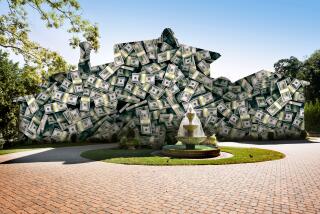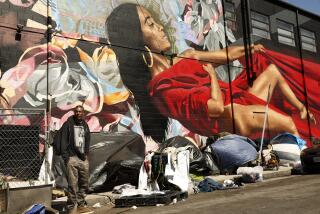L.A. tax-hike vote patterns tell a tale of two realities
Nearly every week, 70-year-old Barb Johnson hears word of a nearby robbery or car break-in in Vermont Knolls, her neighborhood of modest bungalows just west of the Harbor Freeway in South Los Angeles.
So it was alarming, she says, to learn this week that voters had rejected a proposed city sales tax increase that the mayor, the police chief and other civic leaders said was vital to shoring up the Los Angeles Police Department and improving emergency services.
“How are we supposed to keep our streets safe if there’s no money?” the retired office manager asked.
Over the mountains, in the distant northwest San Fernando Valley suburb of West Hills, Orly Salem, 59, was unmoved by City Hall’s plea. A construction company bookkeeper, Salem dismissed the proposed half-cent increase in the sales tax with a weary assessment: Enough is enough.
“Every time it’s more, more, more,” Salem said. “When I don’t have money, I cut my expenses. Why can’t they do the same?
A detailed Times analysis and interviews with those and other voters found starkly contrasting vote patterns and perceptions of the proposed sales tax hike across the nearly 469-square-mile expanse of the sprawling city.
In many South Los Angeles precincts, support for the tax increase was overwhelming, as high as 86%. The opposite was true across large swaths of the northwest San Fernando Valley, the Westside and San Pedro, where “no” totals ran as high as 83%. Overall, the measure was defeated with 55% of voters opposed, according to unofficial results.
The contours of the results — and the overall outcome — show the well-established voting dynamics in Los Angeles that will play a significant role in the current campaign to replace Mayor Antonio Villaraigosa. More fiscally conservative, independent and Republican voters are concentrated in middle- and upper-income neighborhoods on northern, western and southern fringes of the city. And Tuesday they followed a historic pattern of going to the polls in larger numbers.
Proposition A offered a new look at the divergent views of City Hall, public spending and how elected leaders should respond to the steady reduction in public services precipitated by a municipal budget crisis and the Great Recession.
Several Valley voters interviewed by The Times said they don’t trust City Hall to manage its money and live within its means. They also didn’t believe that the $200 million in new revenue anticipated from the tax hike would have gone to public safety.
Police Chief Charlie Beck appeared in ubiquitous TV ads for the measure warning that public safety was at risk. He also told reporters the LAPD would lose 500 officers if the city did not get the added sales tax income. But voters like Mel Mitchell, 67, a resident of the northwest Valley hillside community of Porter Ranch, weren’t swayed.
“I like to think the voters are getting smart about that stuff,” he said.
The size of next year’s projected budget shortfall has been a moving target since the election. Villaraigosa suggested Thursday it could drop sharply, from a previous estimate of $216 million to less than $100 million. The city’s chief fiscal analyst countered Friday that officials still need to close a gap as large as $165 million.
Attitudes toward the issue divided along economic, ethnic and geographic lines but not in ways the campaign debate necessarily would suggest, according to election results, Times polling data and interviews.
Opponents of the measure argued it was a regressive tax increase that would place a heavier burden on lower-income families than other tax alternatives, such as taxing real estate transactions. But working-class, heavily Latino communities proved to be some of Proposition A’s stronger supporters.
In the closing days of the campaign, two-thirds of Latinos backed the measure, according to the USC Sol Price School of Public Policy/L.A. Times Los Angeles City Primary Poll. Nearly three-fifths of white voters opposed it, the poll found.
“Latinos do support bigger government more than smaller government,” said Mark Hugo Lopez, associate director of the Pew Hispanic Center. In a survey conducted last year, his organization found that 81% of immigrant Latinos prefer a bigger government to one with fewer services. That support fell to 72% among second-generation Latinos and 58% in the third generation.
Villaraigosa said he was not surprised that working-class neighborhoods more heavily favored the proposed tax increase.
“The people that need government are more supportive of a balanced approach to resolving our budget challenges,” he said. “They don’t want to see cuts in services. They want to see the city tighten its belt in the way that we have.
“But they understand that in this economic climate, we need some new revenue source.”
Councilwoman Jan Perry, who represents part of South L.A. and opposed the tax, said warnings from Beck and others about fewer police officers “put fear” into neighborhoods where crime is a constant concern.
“I’m sure that had a hand in people’s decisions,” said Perry, who ran for mayor but failed to make the runoff election.
In Johnson’s Vermont Knolls neighborhood, 74% of voters approved the tax, according to The Times analysis of unofficial results. Farther south, more than two-thirds of residents favored it in the neighborhood where cashier Candy Arrellano, 28, cast her vote.
Arrellano said she knows of shootings and drug deals that have taken place not far from her home near 91st and Hoover streets. She backed Proposition A because she wants her children to be able to play in the frontyard without danger. “That’s why I say, a couple extra cents at Target or the supermarket isn’t going to be a big deal for me,” she said.
In the Valley’s Porter Ranch, 76% of those who turned out opposed the tax, the Times analysis found. In nearby Chatsworth, more than 72% rejected it.
Gas station owner Andre Van Der Valk, who lives in that neighborhood, said voters are “disgusted” with government these days. In addition, he said he was “offended” by the frequent TV spots that warned of reductions in public safety services if the tax hike failed.
Beck should not have been such a public face of the Proposition A campaign, Van Der Valk said. “He’s a good chief, but don’t get into the politics,” he added.
catherine.saillant@latimes.com
Times staff writers Laura J. Nelson and Kate Linthicum contributed to this report.
More to Read
Start your day right
Sign up for Essential California for news, features and recommendations from the L.A. Times and beyond in your inbox six days a week.
You may occasionally receive promotional content from the Los Angeles Times.









